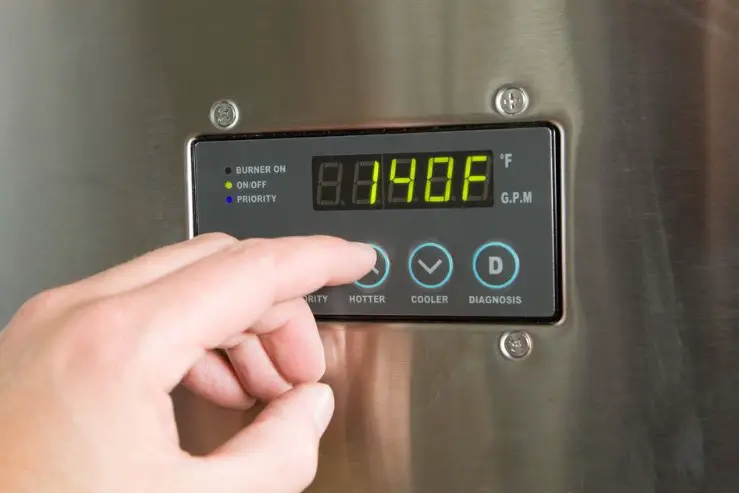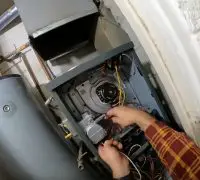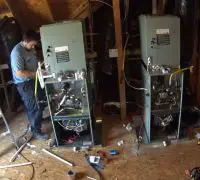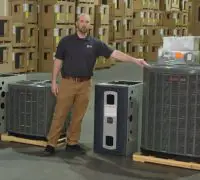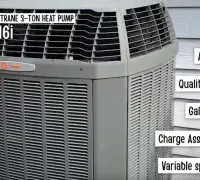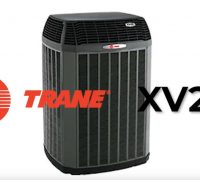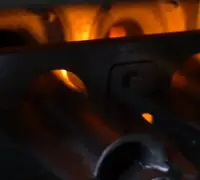If you're looking to fix or replace your Heating or A/C system, we can connect you with a reliable and cost-effective professional in your area.
In theory, the best part about tankless water heaters is that they give you hot water on demand, right at the moment you’re tapping the hot water. You don’t need to wait, and the hot water comes out almost instantly. But is it really like so in real life?
Page Table of Contents
What does “instantly” mean for tankless water heaters?
Tankless water heaters will only give hot water when you need it, but the amount of time you need to wait is affected by several factors.
For instance, the distance from the tankless water heater to the faucet/appliance you’re using affects the amount of time the water needs to travel for coming out of the faucet.
When the unit is working flawlessly, you shouldn’t wait for more than a couple of seconds- we’re talking about an average-sized household. In the case of larger houses, though, the water may need more than a couple of seconds to go through the water pipes and reach the faucet/appliance you’re using.
A tankless gas heater may heat the water instantly, needing only a couple of seconds to provide you hot water. However, many things give sense to the “instant” meaning.
Do electric tankless water heaters need more time for warming up?
Similar to gas tankless water heaters, tankless electric water heaters will start to warm up only when you’re tapping the hot water. In a nutshell, no water is heated before you actually turn on the faucet or turn on the washing machine.
Most of the time, an electric tankless water heater gives hot water within seconds. You may have to wait longer in the case of gas tankless water heaters, even though we’re talking about seconds and not minutes.
Basically, tankless units need 15 seconds to heat water to the set temperature, but you may still have to wait longer than that until hot water comes out of the faucet/showerhead. Should the distance between the fixture and the tankless unit be higher than 50ft, you may have to select a model with a built-in recirculation pump. The pump will save you a lot of water and decreases the waiting time as well.
Side note: Everybody wants to have hot water instantly, and the hot water recirculation system is one solution. Recirculation works with the help of a “loop” developed in the plumbing system of your home. The recirculation system features a return line back to the unit- it can be from every outlet or the farthest appliance. The recirculating pump will move hot water through the loop, giving you hot water “instantly.” A timer, a motion sensor, a push-button, a smart speaker, and even your smartphone can turn on the pump, pushing the cold water throughout the system. The pump shuts off automatically one minute later, and you have hot water after a just few seconds.
What factors affect the heating time?
The BTU rating and various circumstances may impact the amount of time your water heater needs for heating the water.
Here are the most important factors that count:
- Incoming water temperature
The temperature of groundwater is going to impact the heat up time. Truth be told, the problem isn’t significant for the conventional water heaters with tanks since they collect and keep the water heated in the reservoir anyway. However, in the case of tankless water heaters, the water gets to the faucet right before it’s used, so it doesn’t have much time for heating. When the groundwater temperature is cold, the water heater may simply not have enough time to heat the water. Add a long distance between your fixture and the tankless unit, and you get to understand why you need to wait more than a few seconds for hot water!
- Settings
Tankless water heaters don’t present a sophisticated design or build, but it doesn’t mean that you can address any issue that develops. At times, it’s only a professional plumber that can take a look at the unit and make the adjustments and calibration necessary for reducing the waiting time.
- Distance between the unit and the appliances
Even if tankless water heaters may be mounted really close to your fixtures (especially the single-point-of-use models), they cannot be very close to all fixtures throughout your home. Therefore, water still travels from the ground, through pipes and system before getting to the appliance you use at the moment. The farther the appliance is from the heater, the longer it’s going to take the hot water to get to you. It’s where structured plumbing and skilled-plumbers come into the picture, as they’re able to set up the system so that you don’t wait for much no matter which appliance you’re using.
- Age/maintenance problems
At the end of the day, tankless water heaters are still mechanical equipment, and it still needs proper maintenance for an excellent performance. Not taking care of your tankless water heater, with regular flushing and water softener installed, may lead to sediment build-up. And once sediment appears within the system, the tankless water heater will have to work harder and slower for heating the water. Not only that, you don’t get hot water as fast as previously, but your tankless unit may suffer in terms of durability and overall performance.
Which solutions ensure “instant” hot water?
The variety of models is impressive, and some tankless water heaters come with an “auto” setting, which allows them to “learn” the hot water demand routine in a household. The system will automatically control the recirculation loop-activation times so that you can have hot water in a blink of an eye.
Another reputed tankless water heater manufacturer provides a line of residential units that give immediate water, without the costs of an always-on circulator or the energy consumption. The hot water doesn’t travel through the system continuously, though. The units feature an integral display on the front so that you may easily set the arrival time at the fixture. The precision is down to the half-hour, which is quite impressive.
All in all, the tankless water heater heaters are the equivalent of high-speed internet for indoor hot water supply. And when you add the recirculation system into the picture, you really get unlimited hot water instantly.
We can definitely connect you with a trusted provider in your area to repair, replace or maintain your heating and A/C systems. Why not let us find a professional for you?
